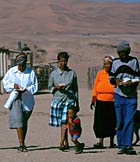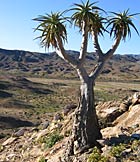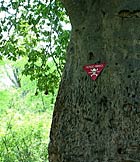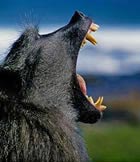|
 |
|
 |

 |

 |

 |
" We are the first generation with tools to understand changes in the Earth’s system caused by human activity, and the last with the opportunity to influence the course of many of the changes now rapidly under way"
Peter Vitousek, Stanford University 1997 |
|

 |
|
Welcome to the sixth edition of the DLIST Newsletter! Our feature article takes a look at the intricacies of information sharing along the Benguela current coastline. The DLIST Team shares their experiences of a combination of Information and Communication Technology that has helped them to reach out to isolated communities along our coast.
This issue is also filled with new developments and initiatives along our coastline. Read about the reintegration and conservation efforts presently undergoing in Angola - a country torn apart by war for many decades, is now looking to focus some of its attention on conserving and managing its unique environment. To the south, in Namibia’s Kunene region one of the issues of discussion has been the interaction between human and wildlife populations, in particular elephants. Can these two species find a balance to a peaceful coexistence? We delved deeper to search for some possible solutions.
DLIST and its partners have had a very busy period in Namibia… undertaking youth activities, festivals and workshops. We give you a round up of some of these activities. In our last edition we mentioned the development of DLIST stakeholder participation course. We are now proud to announce that the course has successfully been developed, be sure see the details on how to register! Our featured partner for this edition is the Richtersveld World Heritage Site, and with good reason. The region is proud to be nominated South Africa’s latest UNESCO World Heritage Site. Read about the challenges, the triumphs and the way ahead.
The newsletter presently goes to all registered DLIST users, as well as many people who may be new to the platform. If you've never heard of DLIST, you can find out more here. If you have suggestions for newsletter articles, please write to our team at admin@dlist-benguela.org.
Best regards
The DLIST-Benguela Team
|
|
 |
 |

|
| IN THE NEWS |
|
Biodiversity in Angola - Reintegration and Conservation
By Vladimir Russo
The outbreak of peace in Angola in 2002, saw the end of years of liberation and civil war that has afflicted the country for decades and resulted in physical, social, economic and environmental devastation to the country. The advent of war and the lack of lasting peace and democracy can hardly be seen as conducive to the country’s healthy growth and development. Yet Angola possesses a unique wealth in regard to biodiversity with 6 unique geomorphologic and climatic regions. The country’s recent turn around in 2002 has given Angolans increased incentive in protecting and managing its immense and rich biodiversity. This article highlights the steps and new perspectives the government has undertaken in conserving and managing its environment – from plans and policies to social reintegration.
[ find out more ]
Humans and Wildlide - Finding a balance to a peaceful co-existence
With growing human populations comes the increased need for land and resources. In Southern Africa humans have been encroaching on spaces ordinarily occupied by wildlife. This new interaction of humans and wildlife has lead elephants, who are largely territorial, to infringe upon farms and crops. The DLISTers held an interesting discussion where they discussed if and how humans and elephants can find a balance to co-existence. Read on to find out more
[ find out more ]
|
 |
What have DLIST and the Partners been up to?
By Nadine Pickering
DLIST reaches out to the enthusiastic Namibian youth who are hungry for information and experiences by arranging coastal field visits that expose them to the day to day processes of coastal towns, a successful crayfish festival kicks off in Luderitz, the second installment of the DLIST film festival in the smaller towns are a hit with local schools, and the NACOMA project makes an endevour to listen to, and portray local communities concerns about their coast… these are some of the recent activities of DLIST and its partners in Namibia.
[ find out more ]
New Courses on Offer!
Registration is now open for the Environmental Engineering: Sustainable Dvelopment in Coastal Areas course, which will commense in January 2009. Environmental Engineering is a SAQA accredited semester course offered through the Department of Mechanical Engineering at the Cape Peninsula University of Technology in conjunction with DLIST. It is a degree level course that is also open to distance learners. DLIST is also proud to introduce another exiting Stakeholder Participation Course! The Stakeholder Participation course is useful to anyone who is interested in the general process of stakeholder participation and is open to anyone.
[ find out more ]
|

|
| RECENT DISCUSSIONS |
|
Human Wildlife Conflict
Communities in the Kunene region of Namibia’s north have been experiencing the problem of elephants roaming onto their farms and eating their crops. This may result in heavy economic losses. But how do they harmonise the protection of their livelihoods and the conservation of biodiversity. Read what the DLISTers have to say:
[ visit thread ]
Researching Potentials of Local Scientific Knowledge using Participatory GIS
Is there a need for the integration of local knowledge with conventional ‘western’ knowledge to achieve successful land use management? Read further to see what the some of the users propose:
[ visit thread ]
Food for Thought
A user notes that because commercial farmers own such large tracts of land in South Africa, they also occupy significant portions of biodiversity and can therefore act as custodians of conservation. How are commercial farmers and private land owners being engaged on conservation issues?
[ visit thread ]
Climate Change is Injustice
Namibia’s environment minister has noted that developing countries are the most vulnerable to environmental stresses and skewed trade and finance relations between north and south. Is this threatening the growth of so called developing countries?
[ visit thread ]
|

|
| NEW IN THE DOCUMENT LIBRARY |
|
- Mitigation of human-elephant conflict in the Kavango-Zambezi TFCA
[ see details ]
- The Local Action for Biodiversity (LAB)
[ see details ]
- Corporate Social Responsibility in mining in Southern Africa: Fair accountability or just greenwash?
[ see details ]
- TRANSFORM: Lessons Learnt from Implementing CBNRM in SA
[ see details ]
- Women of the Earth: Nuturing the Future
[ see details ]
|
| ^ top |
|
|

 |
| |
| |
|
 |
|
| |
|